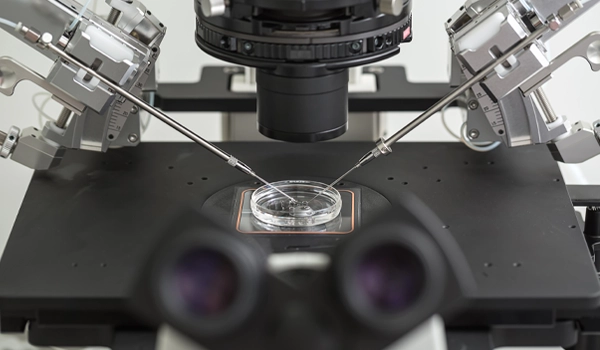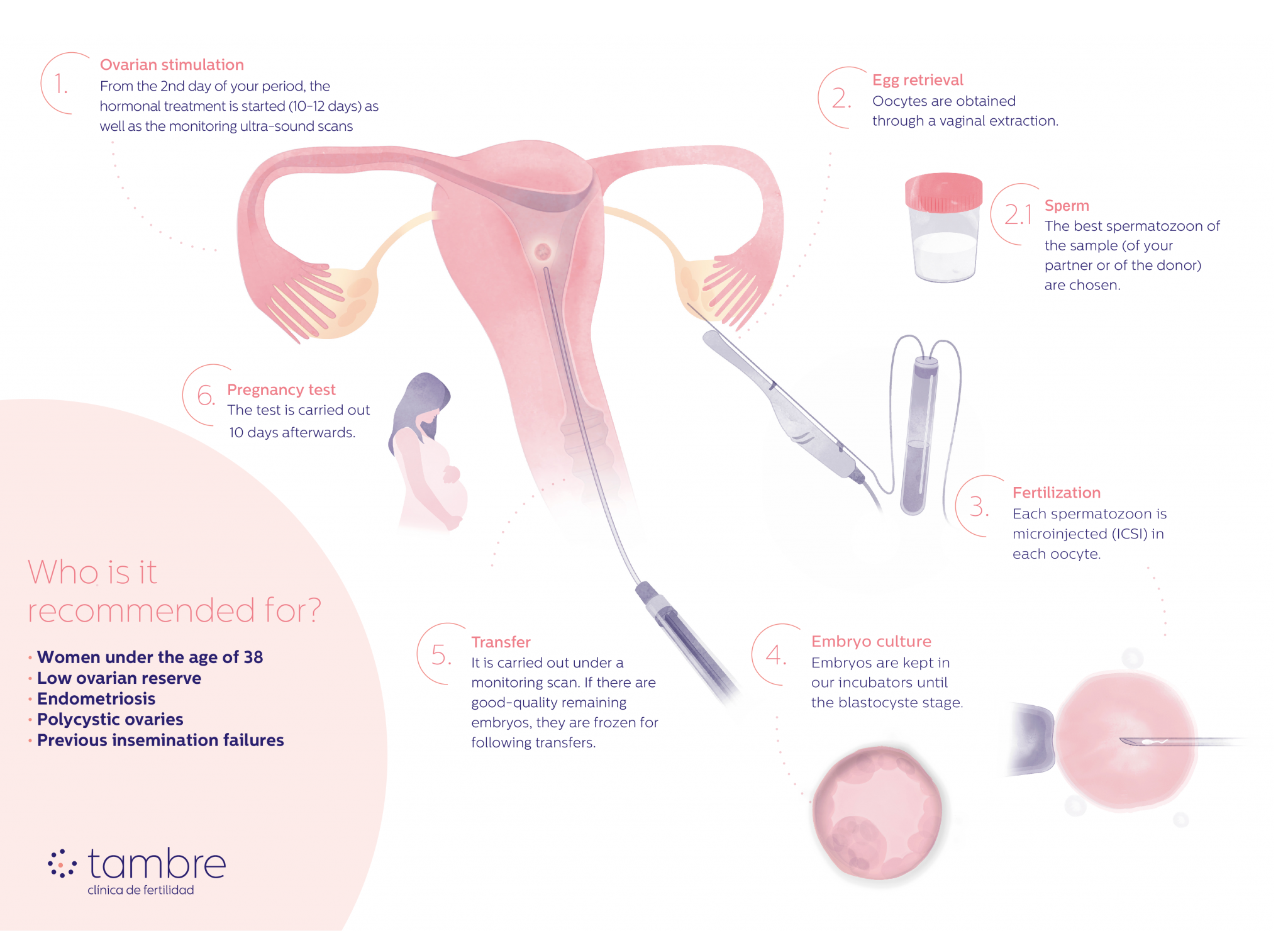IVF with ICSI
Currently the most commonly used technique
Good results and high fertility rates

What is ICSI?
ICSI, which stands for intracytoplasmic sperm injection, is currently one of the most common assisted reproduction techniques. In contrast to conventional IVF, this technique consists of introducing a spermatozoon into the egg. This technique requires great precision and experience, which is why it is carried out by expert clinical embryologists.
This technique allows the best sperm to be selected and introduced artificially, through the egg membrane, inside the egg, so that the oocyte is activated, takes on the genetics of the sperm, fertilises and starts cell division.
Make your dream come true
In vitro fertilisation (IVF) with sperm microinjection is currently the most widely used technique thanks to its good results and high fertilisation rates.

What is the difference between IVF and ICSI?
Both traditional IVF and ICSI are in vitro fertilisation techniques, i.e. fertilisation takes place in the laboratory. The main difference is how the gametes are joined together to create the embryo.
In classic IVF, on the one hand, we have the undamaged egg, with all the granulosa cells still present, and the spermatozoa, which have undergone the capacitation process, and been prepared for fertilising the egg. The egg is placed in a laboratory dish together with the semen so that one of the sperm can penetrate the oocyte. A process that will not occur if either the egg or sperm are of poor quality.
In the ICSI technique, we use a powerful microscope to select the spermatozoa with the best structure and greatest mobility and introduce it with a microinjector directly through the oocyte membrane so that it can be fertilised.
When is this technique suitable and for whom?
Although its use is becoming more widespread, it is usually used when there is a lower percentage of motile sperm, if we find abnormalities in the sperm, if there is a low sperm concentration or if we suspect a fertilisation failure. It is especially suitable for:

Patients suffering from oligozoospermia (low sperm concentration), asthenozoospermia (low motility) or teratozoospermia (few sperm with adequate morphology). In patients with azoospermia (absence of sperm), a testicular biopsy is performed in order to find some sperm.

Patients with advanced age, low ovarian reserve, low number of oocytes obtained in ovarian stimulation, poor oocyte quality or previous fertilisation failure with conventional IVF.
Who can perform ICSI?
As it is a specialised procedure and due to its complexity, it requires a multidisciplinary team with doctors specialised in reproductive medicine and highly specialised biologists. At the same time, specialised equipment with high-resolution microscopes and micromanipulators is needed to carry it out with a total guarantee.
Advantages of ICSI for achieving pregnancy

Higher success rate
It enables high success rates to be achieved with the use of low-quality semen samples that in conventional IVF would not produce an embryo.

Male infertility cases
It overcomes problems such as low sperm concentration, low motility or abnormal morphology.

Selection of quality sperm
ICSI allows biologists to select the highest quality sperm to inject directly into the egg and increase the chances of success.

It reduces fertilisation failure
by injecting a sperm directly into the egg.

Risks of ICSI
The ICSI fertilisation technique is currently very safe. At Tambre we have all the skills, capacity and the best equipment to perform ICSI safely, thanks to our fertility laboratory with the best technology available.
As in a classic IVF, during the menstrual cycle the woman’s ovaries are stimulated to produce an adequate number of oocytes.
Transvaginal ultrasound scans and blood tests are performed to monitor the development of the ovarian follicles and to determine the appropriate time for oocyte retrieval.
When the ovarian follicles are the right size, egg retrieval or follicular puncture is scheduled. It is performed in the operating theatre under light sedation and takes less than 20 minutes.
After egg retrieval, the eggs are prepared in the laboratory for ICSI. The surrounding follicular cells are removed and those that are mature and ready for fertilisation are identified.
The spermatozoa have undergone the capacitation process, so they are prepared to fertilise the egg. Techniques such as swim-up or density gradients are generally used, although other sperm selection techniques can be used such as Zymot-ICSI (Chip fertile), MACS, Sperm-slow etc., which involves separating the seminal fluid and grouping the spermatozoa according to their motility and morphology.
After fertilisation by ICSI, the fertilised eggs are cultured in the laboratory until the embryo is transferred.
Success rates
ICSI is a widely used technique in assisted reproduction centres and offers very good results, with a fertilisation rate of around 80-90%. Currently, at Clinica Tambre 97% of in vitro fertilisation treatments are performed using ICSI and the remaining 3% using conventional IVF.
Does using this technique have an added cost?
Currently in Spain, due to its good results, this is one of the most widely used techniques, and the big difference between Spain and other countries is that in most centres, as is the case at Clinica Tambre, the use of this technique is free of charge.

We provide the best service to our patients
Therefore, if you decide to undergo fertility treatment with us, this technique will be included at no additional cost to your treatment.
How do we work in Tambre?
Specialists in Advanced Reproductive Medicine

We are pioneers in Spain and Europe

45 years of medical excellence

We design tailor-made treatments

State-of-the-art laboratory
More advantages Tambre
- State-of-the-art assisted reproduction laboratory.
- Our own andrology laboratory.
- RI Witness™ for the safety and traceability of gametes.
- GERI®: Embryo Incubator®.
- Fenomatch, we find the right egg donor and/or sperm donor and match them with you.
- Zymot-ICSI (Chip Fertile), selection of the best sperm before ICSI.
- You will have your own gynaecologist and nurse, except for emergencies, and the same medical team will follow your case in depth and attend you from the beginning to the end of the treatment.
- You will have a consultant from our Specialised Tambre Care team who will support you and answer any question you may have throughout the whole process.

We stay with you
Our support team is always at your side for whatever you need
Shall we call you?
Our support team is always at your side for whatever you need
Or send us an email to atpaciente@clinicatambre.com





